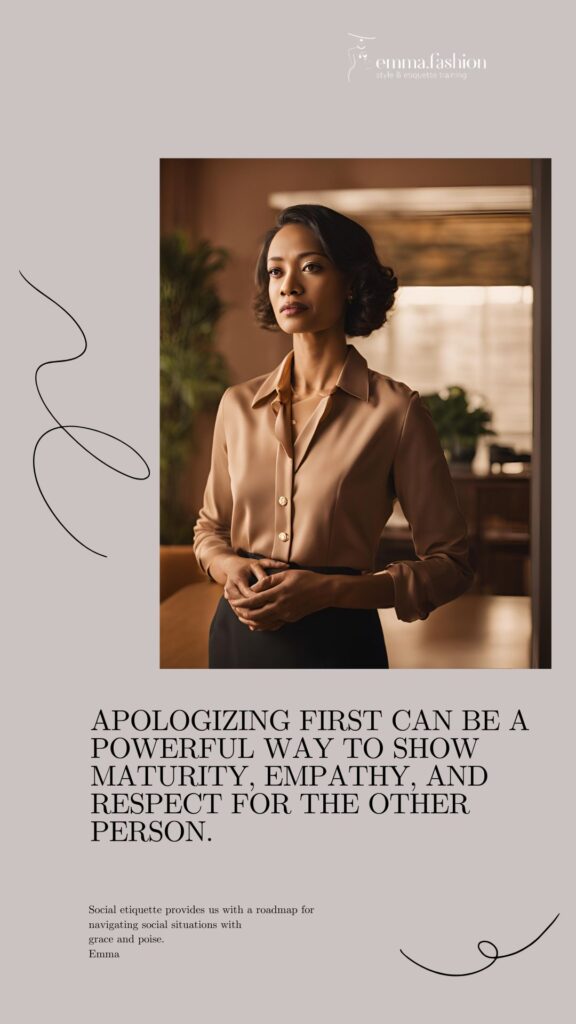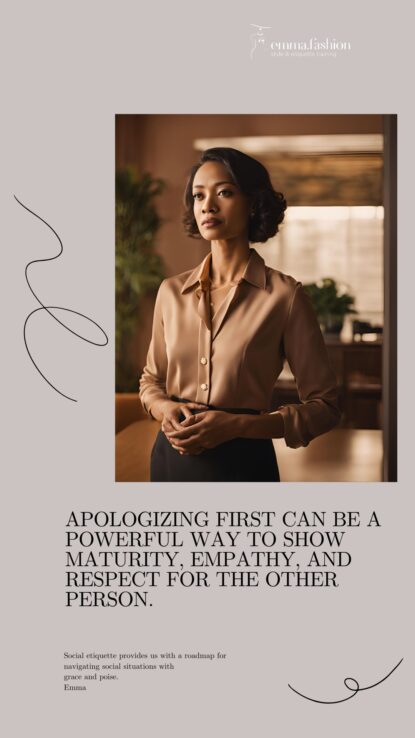Social Etiquette and Apologizing First: When and Why It Matters
Apologies are essential to maintaining harmonious relationships, whether with friends, family, colleagues, or even acquaintances. But knowing when to apologize is not always straightforward. While some situations clearly demand it, others can leave us questioning: Should I apologize first? Or at all? This article explores why taking the first step toward an apology often strengthens relationships and how to recognize when it’s appropriate.
Why Being the First to Apologize Matters
Apologizing first can be a powerful way to show maturity, empathy, and respect for the other person. It conveys that you value the relationship more than your pride, showing you’re committed to preserving a harmonious connection. By stepping up, you also help diffuse tension and signal that you’re open to finding a resolution.
However, being the first to apologize doesn’t mean you should always accept full responsibility, especially if the situation is complex. Sometimes, an apology simply acknowledges the hurt feelings involved or the way a situation has escalated. Saying, “I’m sorry we’re both feeling this way,” can set a tone of shared understanding without implying blame.
When Should You Apologize First?
While it can be tempting to hold out for the other person to apologize, there are situations where stepping forward first is beneficial. Here’s how to identify when that’s the right course of action:
- If You Are Clearly at Fault
If it’s obvious that your actions or words caused pain or discomfort, apologizing first shows self-awareness. Ignoring clear responsibility may come across as defensive, indifferent, or even immature. Admitting fault can make you seem both trustworthy and considerate. - When the Issue Is Minor
For minor missteps, like interrupting someone in a conversation or arriving late to an informal event, being the first to apologize helps maintain goodwill. It communicates that you respect the other person’s time and feelings, making the issue easier to move past. - To Break the Stalemate
In a prolonged disagreement, no one may feel ready to apologize. Being the first to do so can shift the dynamics from confrontation to cooperation. This doesn’t mean admitting defeat—it’s about signaling that you’re willing to move forward and explore solutions. - If You’re in a Position of Leadership
Leaders who apologize when warranted, even if they aren’t fully responsible, show integrity. By doing so, they foster a culture of accountability and mutual respect. If you lead a team, relationship, or family, apologizing first can inspire others to take responsibility when necessary. - When the Relationship Matters
Sometimes, it’s less about fault and more about the value you place on the relationship. If an argument has strained things, apologizing first, even if it’s only for your part, shows a commitment to repair and reinforces how much you value the other person.
When You Might Not Need to Apologize First
While taking the initiative is often positive, there are times when it’s wise to hold off on apologizing:
- When You’re Not Sure What Went Wrong
If you don’t fully understand why the other person is upset, jumping into an apology can seem insincere. Instead, ask for clarification. “I feel that something might be off between us, and I want to understand your perspective” can open a conversation that leads to a more meaningful apology if one is needed. - If It Compromises Your Boundaries
Apologizing should never come at the cost of your own values or boundaries. For instance, repeatedly apologizing may reinforce unhealthy dynamics if someone is consistently disrespectful. In these cases, focus on open communication rather than an apology. - When the Other Person Also Bears Responsibility
In cases of shared fault, it may be best to have a balanced conversation rather than a one-sided apology. A phrase like, “I’d love for us to talk about how we both felt during that situation” can lead to mutual understanding without one person taking on all the blame.

How to Apologize with Grace
Apologizing can be intimidating, especially when you’re the first to do so. Here are tips to make your apology as effective and genuine as possible:
- Be Specific
Address the particular issue rather than offering a vague apology. For instance, “I’m sorry for speaking over you earlier—I didn’t mean to dismiss your opinion” feels much more genuine than a general “I’m sorry for everything.”
- Acknowledge Feelings
Even if you don’t fully understand, recognize that the other person’s emotions are valid. “I understand that my actions hurt you, and I’m truly sorry for that” is a considerate way to respond.
- Offer a Solution or Follow-Up
If the situation calls for it, suggest a way to make amends. Whether it’s giving the other person space or finding ways to prevent similar issues, showing a commitment to improvement reinforces the apology’s sincerity.
- Don’t Expect Immediate Forgiveness
Remember, an apology doesn’t automatically erase the hurt. Be patient if the other person needs time.
Deciding whether or not to be the first to apologize is a personal judgment that depends on the situation, the relationship, and your own values. Ultimately, the courage to apologize first often stems from a desire to maintain healthy, respectful connections. It can be a meaningful step in the path to reconciliation, underscoring the importance of compassion and mutual respect. Whether you’re apologizing for a clear mistake, seeking resolution, or simply valuing the relationship, making the choice to apologize first can reflect the strength and integrity of both you and the bond you share.





Comments